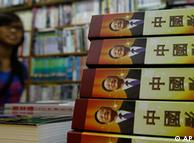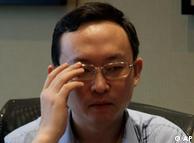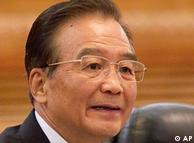Human Rights | 13.01.2012
Chinese dissenters left with no choice but to run
The escape of Chinese author Yu Jie came out of the blue. His arrival in Washington D.C. last week with his wife and son was captured on video and posted on the website of the US radio station "Voice of America".
Yu has long been a thorn in the side of the Chinese authorities. His articles for weblogs and media outlets in Hong Kong are critical of the government, much to the chagrin of the ruling elite.
Police had warned him that he would simply disappear if he continued to write on issues deemed inappropriate.
"Despite these threats, Yu had always hoped that the situation of dissenters would improve before his departure," said Tienchi Martin-Liao, chairman of the independent Chinese PEN Center. Martin-Liao is an old friend of Yu’s and says she has been in contact with him since he fled China.
 "China's Best Actor: Wen Jiabao" is a best-seller in Hong Kong
"China's Best Actor: Wen Jiabao" is a best-seller in Hong Kong
"That he resorted to this step [leaving China] shows that the situation for authors and intellectuals in China has not only not improved, but will continue to deteriorate."
Martin-Liao said Yu had planned to leave China long ago: "He told me that he can’t stay in China anymore, because his personal safety is no longer guaranteed." She received Yu’s email from Virginia state in the morning, confirming he was “staying with friends at the moment. He will fill me in on his future plans and the whole thing later."
Yu’s decision to leave China followed one particular incident early last year. "At that time Yu was abducted by the Chinese security authorities. Police bagged his head and dragged him to the middle of nowhere, where he was thrashed brutally," tells Martin-Liao.
"The policemen stripped off his clothes and took naked photos of him."
Forbidden criticism
The 38-year-old Yu is a close friend of the imprisoned Chinese Nobel Peace laureate Liu Xiaobo and one of the signatories to "Charter 08", a manifesto for freedom of expression and democracy in China. Furthermore, Yu is active in a Christian underground church. Because of this, he had the chance to meet with the Christian former US president George W. Bush.
Yu is best-known for his book "China’s Best Actor: Wen Jiabao", in which he speaks his mind on the Chinese premier, breaking a taboo in the country. The book was published in Hong Kong but banned on the Mainland.
Yu’s most famous work was recently turned into an audiobook by the Chinese language service at Deutsche Welle under the DW-Project China's Forbidden Library, and can be downloaded from the Deutsche Welle website free of charge.
"Either as a critic of Wen Jiabao or the Chinese government, or as a general critic, we are all in a process of learning, which means I must learn to express my judgments more rationally and more objectively. As for the government, it should learn how to deal with criticisms," said Yu in an interview with Deutsche Welle in summer 2010.
Home raid
The fate of another well-known human rights activist, Hu Jia, also shows how the Chinese government deals with criticism. Hu - who was released from prison last June after serving a three-and-a half-year sentence for "inciting subversion of state power" - recently raised the point on microblogging service Twitter that authorities were denying jailed human rights lawyer Gao Zhisheng visitors. Hu initiated an online petition calling on the government to allow Gao’s family to see him. Hu's punishment for these acts was a police raid on his apartment and a subsequent interrogation earlier this week. Police confiscated his and his wife’s computers to search for more dissenting material.
With such measures commonplace, it seems that dissidents in China will continue to face three scenarios: being muzzled, detained or forced to flee the country.
Author: Christoph Ricking / mw
Editor: Darren Mara
余杰
新闻报道 | 2012.01.12
"余杰们"为什么逃离中国
1月12日,独立中文笔会会长廖天琪收到中国独立作家余杰邮件,告知她已经和妻儿一起到达美国,暂居在维吉尼亚的朋友家中,在他临行前,他曾发邮件给廖天 琪,表示自己再不能待在中国,被迫远离中国。因为对一个作家来说,最重要的是写作和表达自由。此前他已经变卖家产和将藏书寄往美国。 余杰的著作《中国影帝温家宝》,目前已经在德国之声“禁书选读”栏目播出音频版
余杰的著作《中国影帝温家宝》,目前已经在德国之声“禁书选读”栏目播出音频版
余杰为中国知名的独立作家,曾出版《火与冰》、《铁屋中的呐喊》等作品,他在香港新世纪出版社出版了抨击中国政治高层的《中国影帝温家宝》,后德国之声制 作成音频播出,反响颇大。他也因此更受中国当局打压。2010年10月,刘晓波获得诺贝尔和平奖后,余杰自10月14日从美国回到中国后即受到中国警方的 软禁,他曾接受德国之声的采访详细叙述他的遭遇,其后,他被迫噤声,有消息传出他遭到酷刑。
近年,多位中国公共知识分子被迫离开中国,2010年7月,中国作家廖亦武抵达柏林,目前旅居德国;近期中国艺术家艾未未也表示,他愿意在监视居住期满后,尽快到柏林艺术大学就职。
知名评论人莫之许在Twitter上表示,已经有越来越多的朋友被迫离开了中国。前《经济观察报》记者覃里雯早前写了一封信送别余杰,披露余杰在2010 年底刘晓波获奖及颁奖期间被国保关押折磨的情节,其中提到他的手指几乎被警方折断。信里说道"自由在哪里,祖国就在哪里"。
"他们在中国不能发出声音、出版……"
独立中文笔会会长廖天琪也向德国之声介绍了余杰出走美国的原因:"为什么象余杰这样有社会责任感、对于国家感情很深的一个知识分子,会选择离开国家的这条 路,很多原因是大家都可以猜测到的,最直接的原因去年中国当局加大力度对付有一定话语权的公共知识分子,他们用'黑头套'的方式绑架了余杰,然后对他进行 了残酷的侮辱性的虐待,六七个人将他的头蒙上,扒光他的衣服,还拍了照片,并且警告他'如果你不老实,我们就让你在地球上消失'。另外他的妻子刘敏也失去 了工作,"
廖天琪也表示,之所以现在才公布余杰所受的酷刑也是出于对他在中国安全的考虑。在余杰遭受酷刑后虽然被放回,但这段经历已经成为他挥之不去的噩梦和随时可 能再次发生的现实:"事实上他受到的身体上和精神上的创伤是非常重的,这也是让他最终作出出走决定的最重要的原因。看上去他还有一些有限度的自由,事实上 他象中国当局手掌上控制的小虫,他们随时可以把他捏死。"
廖天琪也认为从大的原因来讲,在中国凡是有良知的、关注社会的公共知识分子,当他们对社会上的不公平之事发出声音时,这是当局所不能容忍的:"我相信中国 政府有一套确切的机制来对付这些人,余杰选择的这条路和廖亦武是完全一样的,他们在中国不能发出声音、不能出版,他们可以苟延残喘的活下去,但那不是一个 知识分子或写作者愿意要的生活。"
"他们离开了祖国,但并没有失去故乡"
廖天琪也认为这些公共知识分子的出走,对于中国来说是巨大的损失:"他们的观察是细致的,他们是没有私利的,有异议时他们会提出,他们提出的态度和方法也是理性的,如果当局不能接受温和的建议,我不知道当局还要怎么样,他们完全一意孤行了。"
但廖天琪并不认为,余杰们离开中国后,就等于失去了故乡,他们依然和中国的命运绑定在一起:"这样有责任感的知识分子,即使离开了这片土地,他们的心还系 在这上面,他们还会继续观察,提出建议和批评,他们并没有失去故乡。在这个过程中,中国也会不断的作出大的改变,这其中也会牺牲很多人的自由甚至是生 命。"
作者:吴雨
责编:李鱼
99999999999
2009/7/5
Dears,
提醒大家,
明天就是余杰《從柏林圍牆到天安門》書友會囉,
作者余杰受邀從國外來台,
經出版社邀請後,
特地抽出空檔到小小來舉辦這場難得的書友會,
如果有朋友對這樣的主題也感興趣,
歡迎大家邀請朋友一起來喔:)



沒有留言:
張貼留言